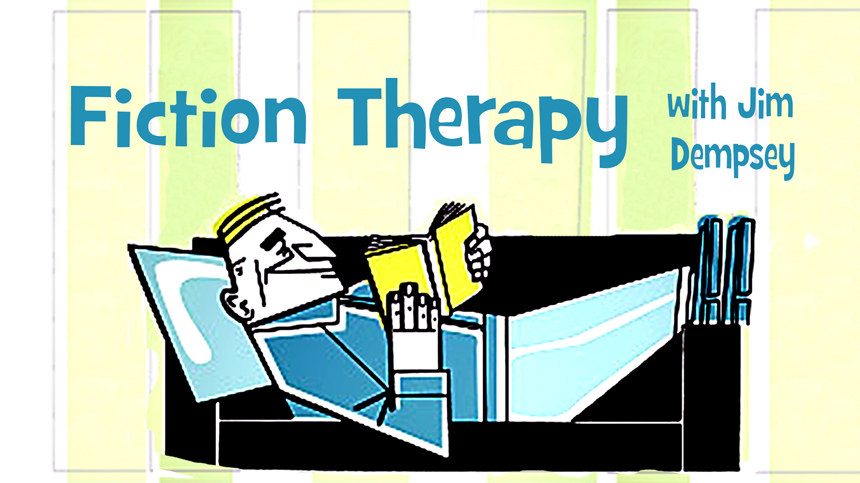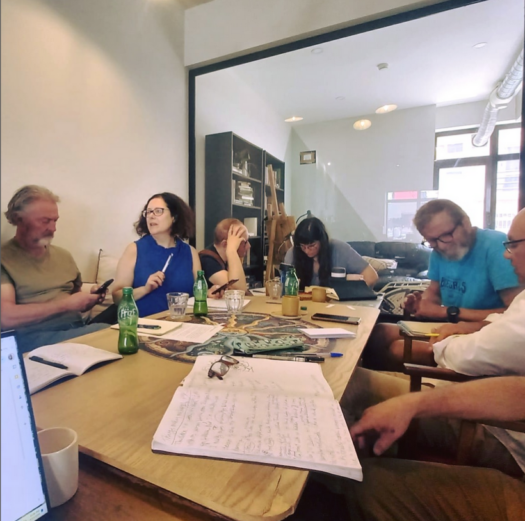The Wonders of a Writing Group
By Jim Dempsey | October 18, 2024 |
 It’s been a while since I’ve written for the wonderful WU community. It’s good to be back. I’ve been busy, and I thought it might be useful to let you know what I’ve been up to. I think it’s a situation many of you will recognize.
It’s been a while since I’ve written for the wonderful WU community. It’s good to be back. I’ve been busy, and I thought it might be useful to let you know what I’ve been up to. I think it’s a situation many of you will recognize.
I moved to a new city recently, to a whole new country, to Portugal. One thing I knew I would miss was my old writing group, and I knew that finding another group here, where I could write in English, could be tricky.
I hadn’t even moved to Lisbon, with all the multicultural opportunities a capital city can offer; I had moved close to a smaller town, called Caldas da Rainha, just one hour from Lisbon and the international airport, and known as the city of creativity. It has an excellent, internationally recognized art and design school too, so I wasn’t exactly isolated.
But there wasn’t a writers group.
There was, however, a regular open-mic event for writers, called Wordplay. It’s an incredible, inspiring, foot-stomping, table-banging occasion with writers reading original work in whatever language they write in: Portuguese, English, Spanish, Turkish, whatever. It had it all. And I had met my people.
I spoke with the organizer, Jazz Meyer, a fellow editor, writer and filmmaker. We talked about writing, and she mentioned she met up regularly with another writer ,and they would both be keen to expand their meetings to include others.
A Sense of Community
And that was it. We started our writers group in November 2023, which now has a core of around ten people, and we often have fifteen or sixteen people each time. And it gives everything that all good writers groups give.
It provides support. With writing being such a solo activity, it’s important to check in with other people at times, especially those who are in a similar situation.
And because most people write on their own, it’s also easy to skip a day. Or a week. Or even a month, which can continue for a longer time, and can run into being a very long time. Meeting once a month forces you to write something that just might get you back on track.
A writing group helps you see your progress too. You can revise based on the feedback you receive. Through writing exercises, you can pick up and develop new techniques, new perspectives and experiment with different ways of writing. Over the months and years, you can see how your writing has improved and, equally as rewarding, see how the writing of others in your group has progressed.
Every writing group is different, but if you’re thinking of setting one up, here’s how we do it.
Structure in Creativity
Our meetings start, of course, with an introduction, and we get straight in to writing. We start with a simple prompt like: write 50 words that tells us three things about you, but one is a lie. The others have to guess the lie. This is great in the early days for getting to know each other. An exercise at the start also helps to shift your brain from its usual problem solving, list making processes into something more creative.
We then get to pieces we’ve written based on a prompt from the previous meeting. Something usually arises each time we meet that inspires the prompt. A good example is when one member mentioned that she had four birthmarks. ‘How did you get four birthmarks?’ asked another. ‘I was born four times,’ she replied. And that was the prompt: write about how a character got four birthmarks. We write around 500 words inspired by the prompt and upload them so others can access them before we meet. Those who want to can read their stories out loud to the group.
After a quick break, we get into a feedback session. Usually someone has written a longer piece: a short story or a book chapter. We usually have at least a few days to look over the text beforehand, and we go around the group with everyone giving their constructive criticism of the work.
And this is an important point: any feedback should be constructive, and it should be about the work. We make it clear this is only about the words on the page, not about the person, their inspiration, or even whether this is biographical or not.
 Remarkable Successes
Remarkable Successes
During the round of feedback, the author is not allowed to respond until everyone has had a chance to say something. This is a well-known creative writing feedback technique, called the booth method because it’s like the writer is locked in a booth with headphones and can hear but cannot speak. This saves the author from giving their initial reaction, which can often be defensive. If nine or ten people all give the same feedback, however, it might be clear that there are some issues with the story.
We also go around the group one by one rather than opening it up to anyone who wants to talk. This prevents any one person from dominating the feedback, plus it avoids the feedback becoming too much of a discussion, which often strays off the point.
After we’ve all given our thoughts on the story, the author can respond, and then we can have a discussion. It helps though to have someone facilitate, again so that it doesn’t get off the point.
Before we go, we have another quick writing exercise. This could be something like: pick an item in the room and describe it without naming it, and the others have to guess what it is. A kind of I Spy game. Or take two random items, like a wineglass and a pinecone, and describe how they are alike, as an exercise in writing metaphors.
Variety also helps in our meetings by having exercises in groups or in pairs, and longer exercises like the Fortunately/Unfortunately game.
We’ve had some extraordinary successes in the group, of people developing their writing skills and even personally. For me, I’ve gained more confidence in my writing and reading in front of others. I’ve also been writing more than I have done for a long time. And soon we will expand to offer the same group in the nearby city of Tomar. If you happen to be around there or Caldas da Rainha, you’d be very welcome to join.
How does your writing group help you? What exercises and techniques do you use? How else do you share your writing with others?









Jim, I’m curious what prompted the move to Portugal. It’s so wonderful you have found your tribe there as well. I couldn’t agree more. It took some time for me to find like-minded folks here in Charleston when we moved here 13 years ago, but my little circle of writing friends has grown. I run my writing group the same way I learned from my first writing class–have someone else read your pages cold. Take notes when others speak. Don’t defend your choices. Listen and absorb. Speaking of, I need to get ready for my group today.
Fascinating story Jim and I am happy that you have found your place and your people. When I was raising my children, I found my way into a writing group…your post made me remember how important that was during the time of pre-school, diapers and managing a family. Writers MUST write. And it is lovely when someone is also reading with you are working on. When we moved from Chicago to Des Moines I lost that group and became a solitary writer. Maybe I got more work done without the group…and then there was the Internet…more connections. I also had one writer friend who had published many books. We met frequently. He died a few years ago. A writing friend is always a blessing. Write on, Beth
Jim, off-topic, but if you like chocolate, next time you are in Lisbon, go to Landeau which has chocolate cake that will make you swoon with pleasure. On-topic, you have motivated me to look into local writer’s groups. I think of WU as a premier writing group, but meeting in real life offers deep pleasures, like that chocolate cake.